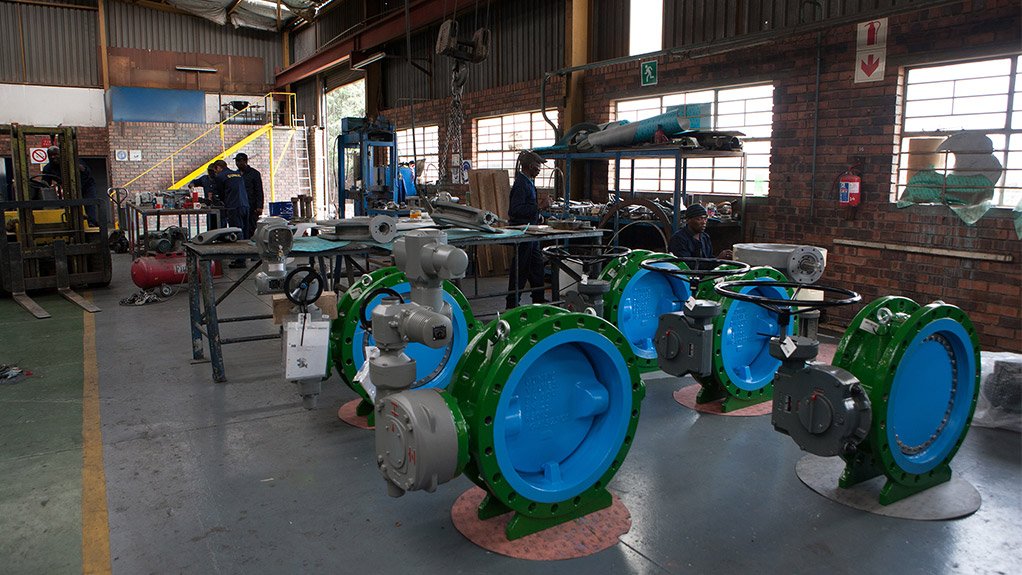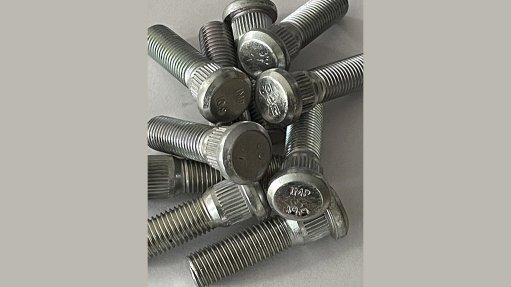Local valve procurement strengthened by partnerships


ENCOURAGING ENTREPRENEURS Local valve designation will stimulate entrepreneurial opportunities in the industry
The Valve and Actuator Manufacturers Cluster of South Africa (Vamcosa) has established working groups with several State-owned entities (SOEs) to encourage local valve procurement, says Vamcosa champion Greg Walker.
This follows after the instruction note for the local valves designation was signed and issued by National Treasury in February, the contents of which came into effect on March 3, setting the local valve content requirement at 70%.
While the designation process is a result of government acknowledging the need for job creation in the manufacturing sector, which has been met with relief from local valve manufacturers, Walker says the issuing of the instruction notice now enables Vamcosa to activate other industry initiatives.
“We will see emphasis being placed on product development and various innovations, as well as the introduction of new technologies, which will assist in developing the industry and adding to our overall competitiveness,” he adds.
Already working groups have been established for Vamcosa to work directly with SOEs. Current working groups are the Eskom coal-fired power station working group, the Eskom nuclear working group, the PetroSA working group, the Transnet working group, the KwaZulu-Natal Water Board working group and the Gauteng water working group for the purpose of promoting local procurement and encourage business relationships with manufacturers.
“Key aims of the working groups include establishing which valves can be supplied by local manufacturers, which valves can be developed and manufactured by local companies for SOEs and which valves will never be supplied by local manufacturers,” Walker says, adding that the working groups also monitor the quality and lead times of the local valve suppliers.
Further, Walker emphasises that State-owned and municipal companies will benefit from using local manufacturers, as they can offer more comprehensive technical backup and have better knowledge of South African conditions than most importers; therefore, enabling the buyers of these products to have greater control over their facilities.
He adds that Vamcosa has had significant success in establishing relationships with these companies through the working groups.
Additional programmes to promote local valve designation and increase local production include initiatives by the Dutch government, such as the Centre for the Promotion of Imports (CBI) and the Manufacturing Acceleration Programme (MAP).
The CBI programme helps members become export ready by assisting them in obtaining the necessary export accreditations, developing an export plan and attending trade shows in Europe, Walker explains.
MAP is designed to assist member companies in producing valves more efficiently by implementing state-of-the-art enterprise resource planning systems.
“By increasing local valve production, the industry can drive down unit prices to become more locally and internationally competitive,” he adds.
Further, the Technology Localisation Implementation Unit, a programme run by the Council for Scientific and Industrial Research, includes an initiative to build a valve-testing facility for member companies to develop new ranges and carry out verification tests on existing valves, Walker says.
Procurement Challenges
While several local valve manufacturers have registered an increase in inquiries for products, many companies have not benefited yet from the designation, Walker points out, citing several challenges that the cluster has to deal with.
“Although the instruction notice was issued to the SOEs, it is often not filtered down to the supply chain management procurement companies, while others have blatantly disregarded the notice by continuing to place orders for imports, overlooking the local valve market,” he says.
In addition, several SOEs had already entered into existing contracts with valve importers for a certain period, prior to the instruction notice,” Walker explains.
Other challenges include increased expenses for local valve suppliers, as they have to cover additional expenses for verification and certification of the valves by the South African Bureau of Standards (SABS). The SABS has been appointed by the Department of Trade and Industry (DTI) as the agency for local content verification, and all bids over a certain value, such as over R 30 000, have to be verified by the SABS’s local content office, Walker adds.
“This increase in expenses potentially places local valve manufacturers in an uncompetitive space,” he says, suggesting that possible solutions could include a detailed outline of the procurement process and the possibility of preverification and certification of local content.
Further, he notes that the instruction notice for local designation does not stipulate that castings and forgings have to be procured from a local foundry or forging shop.
Although a key aim of the valve designation is to ensure benefits for the local foundry industry, this lack of instruction could stymie job creation and further employment opportunities, as companies could import the castings, machine and distribute the valves locally, while still complying with the 70% local content requirement, Walker comments.
He adds that Vamcosa aims to have the requirement for local castings included in the instruction notice.
Meanwhile, Walker contests claims that the foundry industry lacks the production capacity and capability to manage increased product demand, stressing that the quality of South Africa’s castings is world class and its technical specifications meet international requirements.
Walker expects that local designation will provide an increasing number of employment opportunities in the industry, despite employment in the industry decreasing from 3 800 jobs in 1994 to less than 800 currently.
“For every R1-million spent by an SOE, a local valve manufacturer will create one job in the industry and, as SOEs could potentially spend about R2-billion a year collectively in the industry, it will generate a significant number of jobs.”
Entrepreneurial Opportunity
The designation will stimulate entrepreneurial opportunities for valve importers and individuals who want to become involved in the industry.
“As there are designated valves that have not been locally manufactured, the opportunity exists for local manufacturing,” Walker says, adding that locally manufactured valves can include 12 mm, 15 mm and 20 mm shut-off ball valves, manual stop globe valves, various types of check valves and duckbill valves, as well as rack and pinion pneumatic actuators that control the valves.
Walker concludes that, as part of Vamcosa’s commitment to the DTI, the cluster, in its broad-based black economic-empowerment working group, is investigating the possibilities of assisting young black entrepreneurs in either producing patterns for castings for local valve manufacturers or in establishing their own local valve production.
Article Enquiry
Email Article
Save Article
Feedback
To advertise email advertising@creamermedia.co.za or click here
Press Office
Announcements
What's On
Subscribe to improve your user experience...
Option 1 (equivalent of R125 a month):
Receive a weekly copy of Creamer Media's Engineering News & Mining Weekly magazine
(print copy for those in South Africa and e-magazine for those outside of South Africa)
Receive daily email newsletters
Access to full search results
Access archive of magazine back copies
Access to Projects in Progress
Access to ONE Research Report of your choice in PDF format
Option 2 (equivalent of R375 a month):
All benefits from Option 1
PLUS
Access to Creamer Media's Research Channel Africa for ALL Research Reports, in PDF format, on various industrial and mining sectors
including Electricity; Water; Energy Transition; Hydrogen; Roads, Rail and Ports; Coal; Gold; Platinum; Battery Metals; etc.
Already a subscriber?
Forgotten your password?
Receive weekly copy of Creamer Media's Engineering News & Mining Weekly magazine (print copy for those in South Africa and e-magazine for those outside of South Africa)
➕
Recieve daily email newsletters
➕
Access to full search results
➕
Access archive of magazine back copies
➕
Access to Projects in Progress
➕
Access to ONE Research Report of your choice in PDF format
RESEARCH CHANNEL AFRICA
R4500 (equivalent of R375 a month)
SUBSCRIBEAll benefits from Option 1
➕
Access to Creamer Media's Research Channel Africa for ALL Research Reports on various industrial and mining sectors, in PDF format, including on:
Electricity
➕
Water
➕
Energy Transition
➕
Hydrogen
➕
Roads, Rail and Ports
➕
Coal
➕
Gold
➕
Platinum
➕
Battery Metals
➕
etc.
Receive all benefits from Option 1 or Option 2 delivered to numerous people at your company
➕
Multiple User names and Passwords for simultaneous log-ins
➕
Intranet integration access to all in your organisation

















